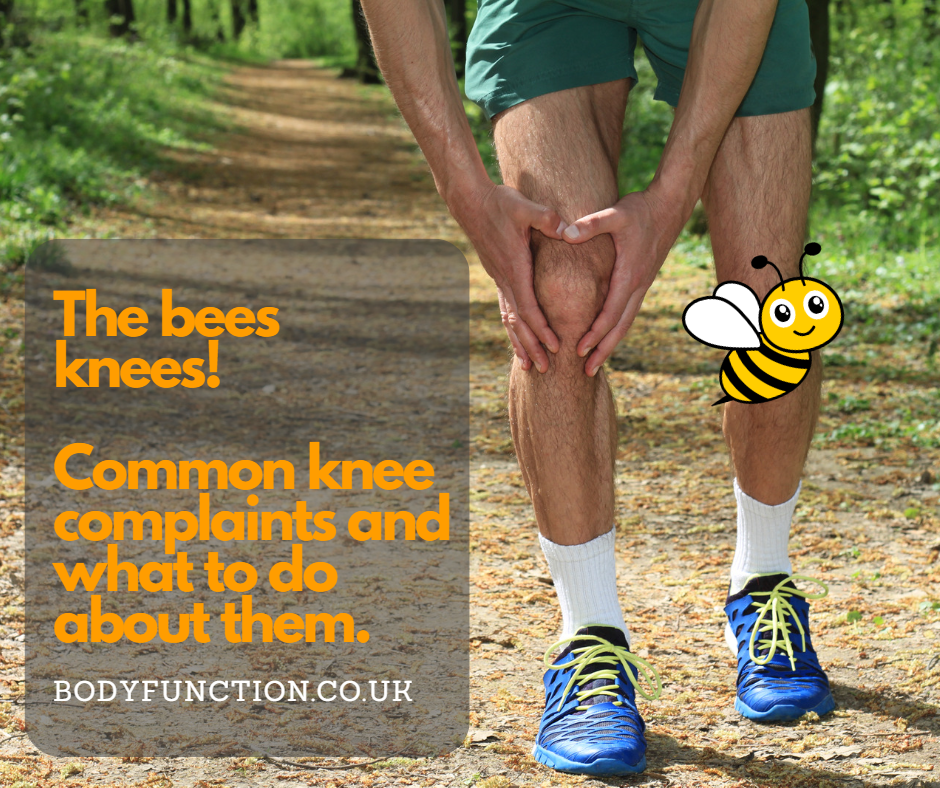24/7 online booking

The bee's knees! Common knee complaints and what to do about them.
Common Knee Complaints | Have you given your knees any thought recently? Chances are that you have, because knees are the part of the body most prone to injury and indeed are the most common reason for long term disability due to sport.
In fact you don’t have to be an athlete to have a knee problem because you can injure your knees through overuse, by having flat feet, unstable kneecaps or imbalanced thigh muscles. Other factors that increase the risk of knee injury include previous knee injury, heavy smoking, osteoarthritis of the feet and, most importantly, being overweight (with a BMI of 25 or higher).
Women seem to be more prone to knee injury than men, this is possible because they have a wider pelvis or it may be because of wearing heels. Walking in heels increases pressure on the knees by about 25%, so try save them for nights out and avoid wearing heels on a daily basis.
The most frequently injured part of the knee is the cartilage that forms the padding between the bones. Cartilage absorbs the nutrients it needs from fluid in the joint but stress on the knee can inhibit this fluid from being absorbed so the cartilage begins to dry out and shred.
Over time, it wears out and arthritis sets in. Although arthritis can have genetic components and can be affected by your nutrition (That healthy diet matters!) wearing heels does not help.
It can be difficult to diagnose exactly what is wrong with a knee so when consulting your osteopath or doctor try to take note of any popping or snapping that may have occurred and how quickly pain and swelling appeared after an injury if that is the cause of the pain.
Very often knee pain can come on slowly so if you have swelling with or without pain and without a history of a direct injury your knee problem may be a result of a foot, hip, pelvis or even low back problem.
To avoid knee problems, it is important to have strong and flexible muscles in the legs, strong muscles help the knee to absorb shock during activity, and flexibility will help prevent injury.
When exercising, start slowly, build gradually and stop if the exercise actually causes you pain, although some discomfort is not a problem as you challenge your muscles this should not be sharply painful.
Common Knee Complaints :
- Good exercises for knee strength are shallow knee bends (squats) which can be performed with your back and hips against a wall, sliding slowly down holding for a count of 10 and sliding back up again.
- Straight leg raises, lie on your back with one leg straight and the other bent with your foot on the floor, slowly raise the straight leg about a foot, hold for 10 seconds and lower again, then repeat with the other leg. Do not attempt to raise both legs together or you could hurt your back.
- Hamstring contractions, lie on your back with your knees bent to about 45o and your feet flat on the floor. Try to push your heels into the floor, you should feel a tightening in the back of your thighs and knees. Hold for 10 seconds
Try 3 repetitions of each exercise a couple of times a day for common knee complaints
For mild knee pain try ice packs, wearing a lightweight tubular bandage or neoprene knee support and doing these exercises, but if pain and swelling are persistent you should seek treatment. You should also avoid jolting or twisting your knees in sports such as running, football, rugby and racquet sports until you have been assessed.
Weight reduction will also help to reduce pressure on your knees as will staying off the high heels.
By looking after your knees you may be able to avoid knee surgery. Although this is necessary for some people if you catch knee pain in its early stages and correct the underlying problems you could prevent it from worsening.
If you’re concerned about your knees and would like one of our osteopaths to give you a thorough assessment, please click here to book an appointment.


Leave a comment